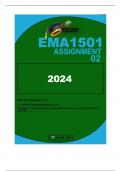, EMA1501 ASSIGNMENT 02
1.1. Define Emergent Mathematics. (4
Emergent mathematics refers to the mathematical concepts and skills that naturally emerge and
develop in young children as they engage in hands-on, interactive, and play-based learning
experiences. These experiences allow children to explore and understand fundamental
mathematical principles such as counting, sorting, matching, measuring, and pattern recognition
in a meaningful and relevant context. Emergent mathematics emphasizes the importance of
nurturing children's natural curiosity and allowing them to construct their own understanding of
mathematical concepts through exploration and problem-solving.
References:
1. Clements, D. H., & Sarama, J. (2008). Experimental evaluation of the effects of a research-based
preschool mathematics curriculum. American Educational Research Journal, 45(2), 443-494.
2. Gelman, R., & Brenneman, K. (2004). Science learning pathways for young children. Early
Childhood Research Quarterly, 19(1), 150-158.
3. Van de Walle, J. A., Karp, K. S., & Bay-Williams, J. M. (2015). Elementary and middle school
mathematics: Teaching developmentally. Pearson.
4. Baroody, A. J., Feil, Y. M., & Johnson, A. R. (2007). An alternative reconceptualization of
procedural and conceptual knowledge. Journal for Research in Mathematics Education, 297-312.
1.2. Think of a story or stories you were told as a child. Think about any part of the story that had
mathematical themes, concepts or ideas and in a paragraph of between 8 to 10 lines or 100
words, relate the memories and mathematical concepts you learned from the story. (10)
One of the stories I remember being told as a child is the classic tale of "The Three Little Pigs".
While this story is primarily about perseverance and hard work, it also contains some
mathematical concepts. The pigs each build their houses using different materials - straw, sticks,
and bricks. This introduces the idea of comparing the strength and durability of different
materials, which relates to the concept of measurement and comparison in mathematics.
Additionally, the story involves the idea of counting, as the pigs gather materials and the wolf
attempts to blow down their houses. This story taught me about the importance of making smart
choices based on mathematical reasoning and understanding the properties of different materials.
(Cuban, 2019)
1.3. Play is often referred to as a child’s work, and that it is very important for learning. In a
paragraph of 5 to 6 lines, examine the relationship between play and emergent mathematics. (6)
Play is critical for a child’s development, including their understanding of mathematics. Through
play, children can explore and experiment with mathematical concepts such as shapes, patterns,
measurements, and number manipulation. For example, while building with blocks, children can
learn about spatial reasoning and geometry. In a study by Clements and Sarama (2007), it was




